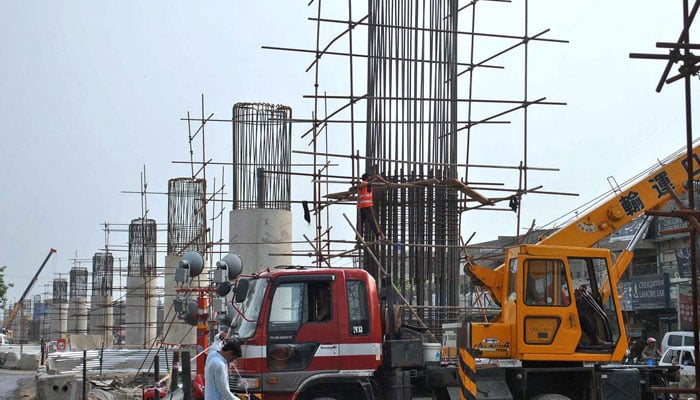The path to sustainable development
LAHORE: The argument that Pakistan has no chance of sustained development due to a combination of corruption, inefficiency, illiteracy and poverty is an oversimplification. While these factors are indeed challenging, development is still possible, albeit difficult, with the right policies, governance and external conditions.
Several countries have experienced growth despite high levels of corruption. According to Transparency International, nations like India, Nigeria and Indonesia have relatively high corruption but have still managed to achieve periods of robust economic growth.
India has a long history of corruption but has emerged as a major global economy, with its IT and service sectors playing significant roles. Its growth can be attributed to market liberalization, entrepreneurship, and a large, young workforce, which we also have.
Nigeria faces rampant corruption; however, its economy has grown due to oil exports, urbanization and the development of non-oil sectors such as agriculture and telecommunications. Indonesia has managed to grow despite corruption due to reforms in key sectors, the exploitation of natural resources and a burgeoning consumer market.
Some countries have abundant natural resources (such as oil or gas) or a large workforce, which allows for growth even when corruption is prevalent. In India and Indonesia, for example, entrepreneurial spirit has driven growth despite institutional weaknesses. Global investors are still attracted to large markets with high growth potential, even if governance is flawed.
Bangladesh had a high poverty rate but continues to grow rapidly due to its thriving garment industry and remittances from overseas workers. Microfinance initiatives have also empowered women and rural populations. Ethiopia experienced high levels of poverty but demonstrated rapid economic growth due to investments in infrastructure, agricultural reforms and industrialization. Vietnam emerged from poverty through reforms (Doi Moi) that emphasized export-driven growth, manufacturing and foreign direct investment (FDI).
Pakistan needs policy reforms similar to those implemented in countries like Vietnam and Bangladesh. These market-friendly reforms have led to industrial growth, increased exports and job creation. We must invest in human resources, taking cues from countries like Sri Lanka and Bangladesh that have made targeted investments in education and healthcare, lifting productivity even among low-income populations.
In developing economies, experts assign 30-40 per cent weight to literacy as a contributor to development and growth. Unfortunately, our education system is in disarray, and Pakistan has the lowest literacy rate among its regional competitors. While literacy is crucial for economic development, it is not the sole determinant. It has a multiplier effect: a literate workforce is more productive, adaptable to technological changes, and able to engage in higher-skilled jobs. Higher literacy rates often lead to more innovation and the creation of new businesses, fuelling growth. Literate populations tend to be more aware of their rights, leading to more accountable governance, which in turn creates a better environment for growth.
Other factors, such as infrastructure, governance and access to capital, play equally important roles in growth. We have not invested in infrastructure projects for the last 15 years due to financial constraints.
A lack of reliable infrastructure (roads, electricity and internet) creates bottlenecks in production and trade. Lengthy processes for business permits, imports and exports can stifle economic activities. Inefficiencies in Pakistan are due to various factors, including corruption, which distorts decision-making, inflates costs and misallocates resources.
When workers are poorly educated or undertrained, they are less efficient, reducing productivity. Institutions lacking transparency, accountability or legal frameworks contribute to inefficiencies by failing to enforce contracts or regulations properly.
The non-accountability of bureaucrats severely hinders growth by delaying reforms. Bureaucrats are key to implementing these reforms; when they are not held accountable, they lack the incentive to drive meaningful change. Experts estimate that the non-accountability of bureaucrats can slow a country’s potential growth by 20-30 per cent, impacting public service delivery, business efficiency and investor confidence.
-
 What You Need To Know About Ischemic Stroke
What You Need To Know About Ischemic Stroke -
 Shocking Reason Behind Type 2 Diabetes Revealed By Scientists
Shocking Reason Behind Type 2 Diabetes Revealed By Scientists -
 SpaceX Cleared For NASA Crew-12 Launch After Falcon 9 Review
SpaceX Cleared For NASA Crew-12 Launch After Falcon 9 Review -
 Meghan Markle Gives Old Hollywood Vibes In New Photos At Glitzy Event
Meghan Markle Gives Old Hollywood Vibes In New Photos At Glitzy Event -
 Simple 'finger Test' Unveils Lung Cancer Diagnosis
Simple 'finger Test' Unveils Lung Cancer Diagnosis -
 Groundbreaking Treatment For Sepsis Emerges In New Study
Groundbreaking Treatment For Sepsis Emerges In New Study -
 Roblox Blocked In Egypt Sparks Debate Over Child Safety And Digital Access
Roblox Blocked In Egypt Sparks Debate Over Child Safety And Digital Access -
 Savannah Guthrie Addresses Ransom Demands Made By Her Mother Nancy's Kidnappers
Savannah Guthrie Addresses Ransom Demands Made By Her Mother Nancy's Kidnappers -
 OpenAI Reportedly Working On AI-powered Earbuds As First Hardware Product
OpenAI Reportedly Working On AI-powered Earbuds As First Hardware Product -
 Andrew, Sarah Ferguson Refuse King Charles Request: 'Raising Eyebrows Inside Palace'
Andrew, Sarah Ferguson Refuse King Charles Request: 'Raising Eyebrows Inside Palace' -
 Adam Sandler Reveals How Tom Cruise Introduced Him To Paul Thomas Anderson
Adam Sandler Reveals How Tom Cruise Introduced Him To Paul Thomas Anderson -
 Washington Post CEO William Lewis Resigns After Sweeping Layoffs
Washington Post CEO William Lewis Resigns After Sweeping Layoffs -
 North Korea To Hold 9th Workers’ Party Congress In Late February
North Korea To Hold 9th Workers’ Party Congress In Late February -
 All You Need To Know Guide To Rosacea
All You Need To Know Guide To Rosacea -
 Princess Diana's Brother 'handed Over' Althorp House To Marion And Her Family
Princess Diana's Brother 'handed Over' Althorp House To Marion And Her Family -
 Trump Mobile T1 Phone Resurfaces With New Specs, Higher Price
Trump Mobile T1 Phone Resurfaces With New Specs, Higher Price




